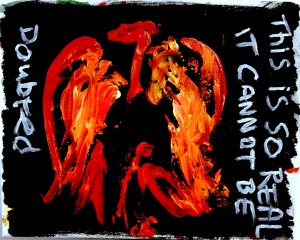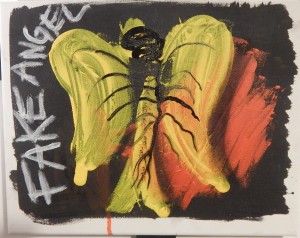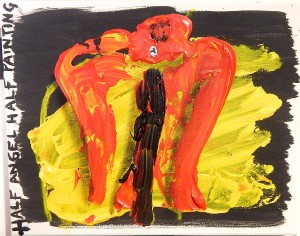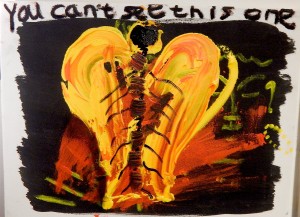I am a Scientist and These are my Angels
My contribution to the Welcome Disturbances group show involved a text and four pictures, reproduced below, and a public conversation with Alexandra Grieser, Professor for the Theory of Religion at Trinity College Dublin. This took place on March 4th, 2015.
I am a Scientist, and These are my Angels
What is the ground from which we speak? If science were to deliver cold, non-negotiable, truth, and if language were to pin that truth to the wall, then there would be no need to look over our shoulders, and to try to find the earth in which our pronouncements grow.
But science, for all its virtues, generates only local consensus, based on shared techniques of measurement, and common presuppositions. And science is vast, sprawling and messy, being done by people who vary as much as non-scientists. The territory is sometimes well mapped, navigable, and ascetic, but it is frequently wild and untamed. And the world of any scientist, or any local community of scientists, will rest on unspoken entities spawned by unseen metaphysical presumptions. These are my angels.
As science moves from the realm of the inanimate (planets, atoms, electricity) to the biosphere, the form of explanation changes. Concerns arise, and value and meaning must enter the discussion. Living beings have concerns, whether they are those of microbe, grass, or person. The sciences of the animate must therefore traffic in values, because the condition of the living is a precarious one. Here, our framing assumptions start to colour the stories we tell: are grasses good for us, or are we good for grasses? How do we balance the concerns of one species with those of another? In our scientific stories, we must now acknowledge conflicting perspectives, and concerns that grow from different and divergent grounds. How much more, then, as we approach human matters, as our stories about our being are couched in the incommensurable languages of biology, society, psychology and culture. These are not independent domains, for we are inextricably bound up in all of these and everything happens all at the same time. Now the proliferation of angels becomes inevitable, and we try to manage this by pretending that knowledge can be apportioned to separate disciplines, protected from each other by administrative fencing.
Within the Human Sciences, one important assumed entity resides, licensing billion-dollar industries, and fuelling popular myths of who we are, how we “work”, and how we fail. The Psychological Subject, presumed to lie behind the personal pronoun, “I”, appears as such an imaginary entity. Emerging over hundreds of years without any plan, but budding forth from the confidence of the Enlightenment, polished, carved, and refined by Protestant insistence on individual agency, given chimerical substance and indubitableness by Descartes, and knitted into our legal and economic fabric, the Subject is assumed, can almost not be questioned, but resists delineation. The subject (experiencing), the subject (legal), the subject (political), the person, the body, the self, the lover, the father, the citizen are mutually conflated and confused. Crafted then by psychologists in white rooms of isolation, with tinting and shading done by statistical construction and obfuscation, a necessary creature of our own construction comes forth, a golem. Unobservable but indispensable, revealed through reaction times, button presses, and Likert scales. The self, by general consensus is now shrunken to the walnut brain that invites and ignores the projections we cast upon it; this is the brain we speak of as if it felt, dreamed, decided, thought and saw, but this brain is meat. Fatty meat. The subject is now sometimes allowed to grow as far as the skin, with the trivial fixer-upper of embodiment. But the subject is still always separate, discrete, detached from the world and from others. We believe we are inside John Malkowitch’s head, but we cannot be John Malkowitch. We think we observe others through a Rear Window, but we fail to see that we are continuous with the other, inhabiting a shared world, time, space.
I don’t see what the problem is. Are you saying you don’t exist? That I don’t exist? I assure you I do. I know I exist long before any psychologist tells me so.
The only acceptable mode of inquiry in the Human Sciences must ask not only “What do we see?”, but “What are we that we should see such?”
I am a scientist and these are my angels.



